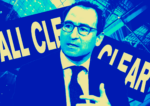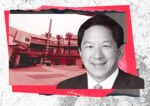 TRD Pro: Manhattan’s most expensive neighborhoods by average sale price
TRD Pro: Manhattan’s most expensive neighborhoods by average sale price
Trending
Chera family fails to raise cash for Brivo proptech merger
Crown Proptech Acquisitions needed $95M to take the company public

One of New York City’s biggest retail landlords has come up short in an effort to invest in protech company Brivo, a maker of card-swipe and other keyless-entry technology.
The Chera family had targeted the Nevada-based firm to combine with its own special purpose acquisition company, or SPAC, but missed a July 9 deadline to consummate the merger.
Crown Proptech Acquisitions, led by CEO Richard Chera, failed to drum up the necessary cash, according to a person familiar with the deal.
The merger would have made Brivo a publicly traded company, unlocking hundreds of millions of dollars in investor cash and giving Crown a front seat at the bonanza. Now the $276 million that Crown raised by selling shares in its SPAC will likely be returned to investors.
Chera disclosed Thursday in an SEC filing that the SPAC did not have $95 million in unrestricted cash, which would have allowed it to secure an additional $75 million from investors and close the merger.
The filing noted that after the merger deadline expired, $68 million in investment commitments were withdrawn by Golub Capital, an investor otherwise ready to close the deal, the person said. Golub had secured a seat on the board of the would-be public company.
Read more
 TRD Pro: Manhattan’s most expensive neighborhoods by average sale price
TRD Pro: Manhattan’s most expensive neighborhoods by average sale price
 City brokerages jockey for position in the Hamptons
City brokerages jockey for position in the Hamptons
Brivo claims to have 20 million users who employ its technology to gain access to 70,000 real estate locations in the U.S.
Crown and Brivo did not return requests for comment. A representative of Golub declined to comment.
SPAC deals rocketed to popularity as an under-the-radar way to take companies public after high-profile flameouts of traditional IPOs, such as WeWork’s in 2019.
Years of cheap borrowing followed by government responses to the pandemic had kept capital markets flowing. But a merky track record for SPAC investors combined with rule changes and increased borrowing rates have complicated the picture.
Among derailed SPAC dreams: Fifth Wall’s decision to not pursue a second such deal, and Goldman Sachs’ exit from the SPAC market all together.




